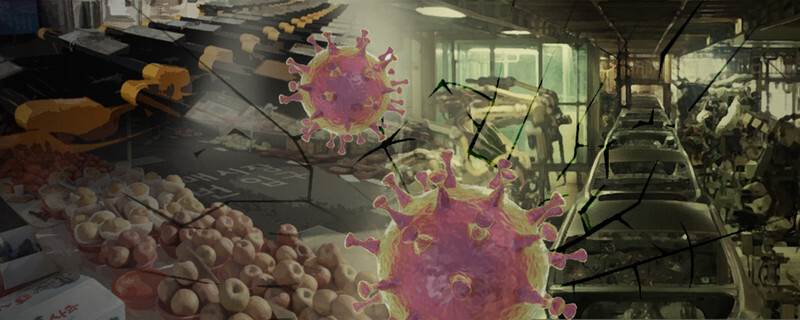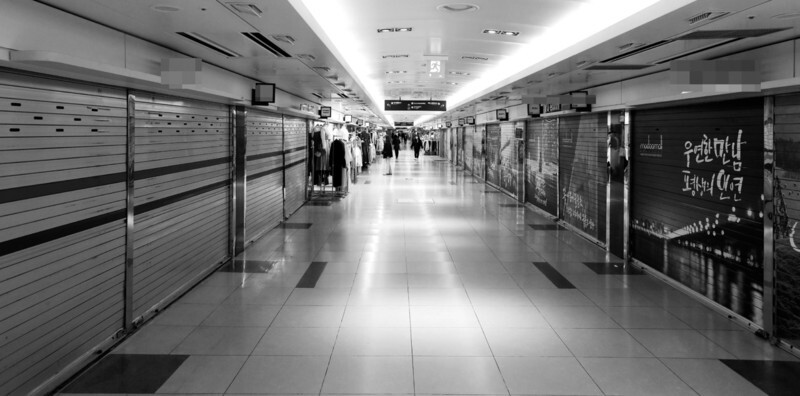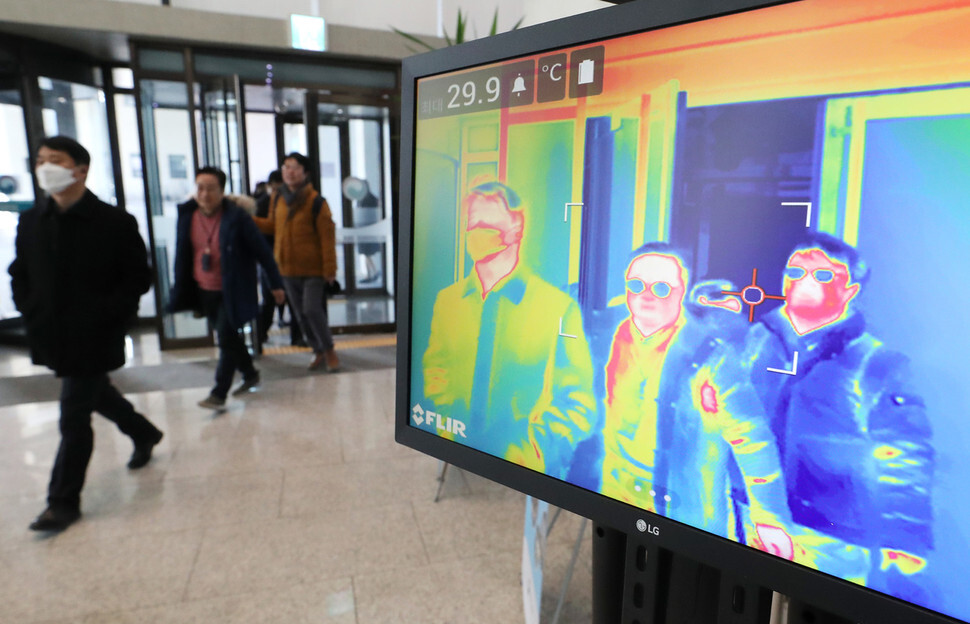hankyoreh
Links to other country sites 다른 나라 사이트 링크
S. Korean economy sinks even further as coronavirus spreads

Just as distribution networks, mom-and-pop shops, and manufacturers with factories in South Korea and abroad seemed to gain some breathing room amid an abated rise of novel coronavirus diagnoses, a sharp spike in cases in the Daegu and North Gyeongsang Province is sounding the alarm once again. While businesses faced production setbacks early on in the outbreak due to a lack of parts from China, the recent cluster of COVID-19 (the disease resulting from the coronavirus) transmissions and the revelation of the people who came into contact with infected persons at South Korean workplaces is dealing a direct blow in the form of factory closures, restrictions on office access, and confinement for hundreds of employees.
On Feb. 24, LG Electronics closed the research center of its Incheon offices for the day and had its employees telecommute -- a decision made after a family member of one of its employees was diagnosed with COVID-19. Samsung Electronics resumed operations at its smartphone production plant that afternoon after they were halted on Feb. 22 when a Gumi factory employee received a confirmed COVID-19 diagnosis. SK Hynix isolated some 800 employees at its Icheon campus on Feb. 20 after one was found to have been in contact with a diagnosed patient; as of Feb. 24, the number of people isolated was down to around 550.
The automobile industry is also in crisis mode again. Around 60% of the country’s automobile parts factories are based in the Daegu/North Gyeongsang region, where numerous COVID-19 cases have been confirmed, and companies could face production difficulties depending on the diagnosis situation among factory employees. Hyundai and Kia Motors resumed most operations on Feb. 24 after suspending some of their production lines over issues procuring parts from China, but the mood is still tense.

The parts company SECO closed its Gyeongju factory after a forklift driver who passed away at his home on Feb. 24 was found to have been infected with COVID-19. SECO is a primary partner company of Hyundai Motor. Hyundai said that it had “sufficient inventory for there to be no issues with vehicle production,” but it is also working on response measures in case the shutdown drags out. Tensions were also high at Ssangyong Motor’s Pyeongtaek factory. On Feb. 18, the parents of a research institute employee from Daegu were diagnosed with COVID-19. The employee in question has not shown any symptoms such as fever or coughing, but has been isolated.
For department stores, duty-free stores, and retailers, the woes have only continued. Lotte Department Store announced that its total sales between Feb. 17 and 23 were down 20.4% from the same period in 2019. Its main branch in Seoul’s Myeongdong area and other branches in Yeongdeungpo and Daegu’s Sangin neighborhood have temporarily halted operations due to visits by COVID-19 patients and other factors. Shinsegae Department store also announced that it sales were down 20.5% from the same period in 2019.
“Since the COVID-19 [outbreak began], sales have fallen by around 50% from the same time last year,” a spokesperson of Shinsegae Duty Free said. E-mart, which previously closed 10 branches due to visits by COVID-19 patients and other factors, has recently been dealing with long lines of customers purchasing face masks and essentials such as water and instant noodles.
Mom-and-pop shop owners have also been complaining of losses. One vendor who sells fruit at Ocheon Traditional Market in Pohang and Angang Market in Gyeongju received word that the markets were closed and went to Facebook to quickly sell off 80 boxes of mandarin oranges.
“I had been selling a five-kilogram box for 10,000 won [US$8.25]. With my daughter’s help, I’ve been able to sell it online for 5,000 won [US$4.12],” the vendor said in a telephone interview.
“I have to dispose of all my product, so it’s better to sell it cheaply, even if I suffer a loss.”

Some businesses are even accepting face masks for cooked meals made from ingredients gathered from stores that have been closed down. The Pho, a Vietnamese restaurant based in Daegu, is exchanging brisket noodle and fried rice dishes that normally sell for 10,000 won to customers who bring in three masks. The masks are to be donated to the city of Daegu, the restaurant said.
“Apart from our main restaurant, all of our Daegu and North Gyeongsang branches have been closed,” said Kim Hyeon-gyu, CEO of The Pho.
“We decided to gather all the ingredients from the main store to prepare dishes to exchange for face masks,” he explained.
By Song Gyung-hwa, Kim Yoon-ju, and Hong Dae-sun, staff reporters

Editorial・opinion
![[Column] Has Korea, too, crossed the Rubicon on China? [Column] Has Korea, too, crossed the Rubicon on China?](https://flexible.img.hani.co.kr/flexible/normal/500/300/imgdb/original/2024/0419/9317135153409185.jpg) [Column] Has Korea, too, crossed the Rubicon on China?
[Column] Has Korea, too, crossed the Rubicon on China?![[Correspondent’s column] In Japan’s alliance with US, echoes of its past alliances with UK [Correspondent’s column] In Japan’s alliance with US, echoes of its past alliances with UK](https://flexible.img.hani.co.kr/flexible/normal/500/300/imgdb/original/2024/0419/2317135166563519.jpg) [Correspondent’s column] In Japan’s alliance with US, echoes of its past alliances with UK
[Correspondent’s column] In Japan’s alliance with US, echoes of its past alliances with UK- [Editorial] Does Yoon think the Korean public is wrong?
- [Editorial] As it bolsters its alliance with US, Japan must be accountable for past
- [Guest essay] Amending the Constitution is Yoon’s key to leaving office in public’s good graces
- [Editorial] 10 years on, lessons of Sewol tragedy must never be forgotten
- [Column] A death blow to Korea’s prosecutor politics
- [Correspondent’s column] The US and the end of Japanese pacifism
- [Guest essay] How Korea turned its trainee doctors into monsters
- [Guest essay] As someone who helped forge Seoul-Moscow ties, their status today troubles me
Most viewed articles
- 1[Column] The clock is ticking for Korea’s first lady
- 2After 2 months of delayed, denied medical care, Koreans worry worst may be yet to come
- 3Samsung barricades office as unionized workers strike for better conditions
- 4[Column] Has Korea, too, crossed the Rubicon on China?
- 5[Correspondent’s column] In Japan’s alliance with US, echoes of its past alliances with UK
- 6Hong Se-hwa, voice for tolerance whose memoir of exile touched a chord, dies at 76
- 7All eyes on Xiaomi after it pulls off EV that Apple couldn’t
- 8US overtakes China as Korea’s top export market, prompting trade sanction jitters
- 9[Editorial] When the choice is kids or career, Korea will never overcome birth rate woes
- 10[Photo] Smile ambassador, you’re on camera